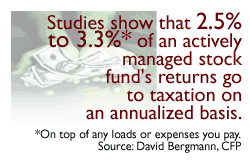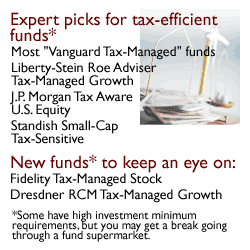|
Take tax bite out of funds
|
 |
June 6, 2000: 10:33 a.m. ET
There are a growing number of tax-aware funds, but do you need them?
By Staff Writer Jeanne Sahadi
|
NEW YORK (CNNfn) - It doesn't take long to figure out that "expense ratio" and "load" mean money out of your pocket when you invest in a mutual fund. But the tax consequences of owning a fund, which can lower your returns significantly, are rarely as clear.
Now there are a host of funds designed to spare you your tax burdens. And while they offer many benefits, few have a proven track record and many have potential disadvantages you should be aware of.
Big returns cut down to size
One of the most common ways your tax bill goes up is if your fund has high turnover in its holdings. When a portfolio manager sells stocks that have done well, the fund company distributes the capital gains from the sale to all investors in the fund. Unless the manager offsets those gains with capital losses from the sale of underperforming equities, you will owe money to the government on the gains incurred, even if your fund ends the year in the red.
 Studies show that if you own an actively managed stock fund, an average of 2.5 percent to 3.3 percent of your return goes to taxes resulting from capital gains distributions and dividend income, said certified financial planner (CFP) David Bergmann of Marina del Rey, Calif. Studies show that if you own an actively managed stock fund, an average of 2.5 percent to 3.3 percent of your return goes to taxes resulting from capital gains distributions and dividend income, said certified financial planner (CFP) David Bergmann of Marina del Rey, Calif.
Add to that the percent taken off the top for expenses, and all of sudden a decent return can be weakened substantially.
Of course, the issue is moot if your fund investments are tied up in a 401(k), IRA or other tax-protected retirement plan. But if you want to invest outside of those plans, "after-tax efficiency is a critical issue," said CFP Mark Balasa of Schaumburg, Ill.
An ETF might be a better bet
Since the number of tax-efficient funds has more than tripled since last year, choosing the best can be tricky.
"It's such a moving target," Balasa said.
He, like others, stressed that in some cases an exchange-traded fund (ETF) -- such as a Spider, which tracks a fixed basket of equities and in which you buy shares that trade like a stock -- can be very tax-efficient for the buy-and-hold investor, since the expense ratios are among the lowest in the market and there is little or no turnover of your holdings.
The tax benefit is lost, however, for the person who trades frequently or uses dollar-cost averaging to invest. That's because you pay commissions every time you buy or sell an ETF.
The tax-sensitive advantage
The advantage to tax-managed funds is that portfolio managers must harvest tax losses to balance out whatever gains they incur and, if possible, try to invest in high-quality stocks with few if any dividends. That's true whether you are invested in an index fund or a more actively traded fund that is designated tax-efficient.
And, unlike with most funds, you don't need to time your investment in tax-managed vehicles, Morningstar analyst Peter DiTeresa said. Normally, you are better off investing in a non-tax-managed fund early in the year, since you must pay taxes on all capital gains made that year anyway but without necessarily getting any of the benefit from those gains.
So, what's the rub?
Before you commit your money to tax-aware funds, keep in mind that while important, tax savings aren't everything.
 "The tax tail should never wag the investment dog," Bergmann said. In other words, do what's best for your portfolio, especially in terms of asset allocation. "The tax tail should never wag the investment dog," Bergmann said. In other words, do what's best for your portfolio, especially in terms of asset allocation.
While the number of tax-efficient funds has grown to more than 70 from a mere 22 last spring, according to data from Morningstar, they don't offer the kind of diversification you would need for a well-rounded portfolio.
"It's not perfect," DiTeresa said.
Many of the funds tend to be large cap and growth-oriented, since most growth stocks do not pay dividends, he said. And when it comes to choice among international stock funds there is almost none -- and what few funds there are, he would not recommend.
If you have money in a tax-sensitive index fund, you should also be aware that the manager must balance two demands: keeping in line with the index and reducing tax costs to shareholders.
As a result, DiTeresa said, "they won't track the index as closely if it means incurring a capital gain."
Potentially that may mean a slightly lower return, but that hasn't been the case with Vanguard Tax-Managed Growth & Income, a twist on the S&P 500 and a favorite among experts. On an annualized basis, it has "almost perfectly" tracked the benchmark index, DiTeresa said. And compared with Vanguard's traditional S&P 500 Index fund, the tax-efficient growth and income vehicle has marginally outperformed it on an after-tax basis.
Minimums may be high
Some of the better tax-efficient funds come with high minimum investment requirements. The Vanguard fund, for instance, requires a first-time investment of $10,000, "which is too bad," DiTeresa said.
Others, like Standish Small-Cap Tax Sensitive or Dresdner RCM Tax-Managed Growth require a much steeper initial investment -- between $100,000 and $250,000.
But that doesn't mean necessarily you can't invest if you're short on change, he said. You may be able to get in with as little as a $2,500 minimum if you go through a fund supermarket that has brokered a deal with the fund company.
 DiTeresa and others gave high marks to nearly all of the Vanguard tax-managed funds in part because of their low expense ratios -- 0.19 percent on average -- and also because "these are some of the oldest tax-managed funds around," he said. DiTeresa and others gave high marks to nearly all of the Vanguard tax-managed funds in part because of their low expense ratios -- 0.19 percent on average -- and also because "these are some of the oldest tax-managed funds around," he said.
He noted, however, that if you try to access them through a supermarket, you may have to pay a transaction fee since Vanguard, due to its low cost options, often opts not to pay a brokerage to install a no-transaction-fee plan as many other companies do.
Some other top picks
Other funds that score big points with experts primarily include those with a history of three years or more and at least a four-star rating from Morningstar. These include J.P. Morgan Tax-Aware U.S. Equity and Liberty-Stein Roe Adviser Tax-Managed Growth.
But DiTeresa said the younger Dresdner RCM Tax-Managed Growth fund and Fidelity Tax-Managed Stock fund deserve a look since their records thus far are quite respectable -- as are the companies that run them.
And among the institutional funds that are targeted for high-net-worth investors with millions to spare, Balasa recommends J.P. Morgan's Institutional Tax-Aware Disciplined Equity, DFA U.S. Tax-Managed 510 Value and DFA Tax-Managed International Value.
Again, you may think you'll be shut out, but if you work with an investment adviser who has a relationship with particular fund companies, Balasa said, you may be able to get into some of the better institutional offerings.
* Disclaimer 
|
|
|
|
|
 |

|

